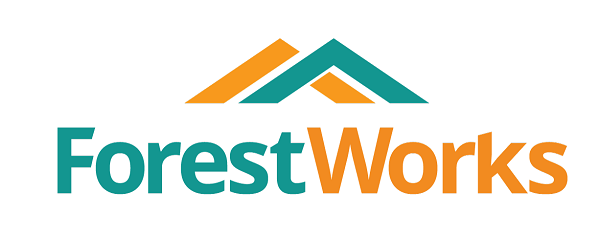Explore projects ForestWorks has completed to support the industry and workforce. We are proud to have worked with a range of stakeholders to deliver successful outcomes for the forestry and forest products industry.
The Snowy Valleys Skills Development Service (SVSDS) is a program designed to support Snowy Valleys forest and timber workers as they adjust to changing job requirements brought about by bushfires. Through the service, timber industry workers and employers based in the Snowy Valleys can access assistance to undertake workforce development planning and relevant vocational training programs provided through TAFE NSW and other training providers. The SVSDS program aims to support a minimum of 40 businesses and 400 displaced workers with employment-focused upskilling and training, so that they have the skills required to capitalise on business and employment opportunities in the region.
The SVSDS program will run from July 2021 to June 2023.
SVSDS is jointly funded by the Commonwealth and the New South Wales Government under the Bushfire Local Economic Recovery Fund.
Eligibility
To be eligible for financial assistance from the Program, the Applicant must:
- operate in the Snowy Valleys, or adjoining NSW LGAs, forest and timber industry
- agree to make a cash and/or in-kind contribution
- agree to provide documentation as detailed in the Application, in a timely manner.
To be eligible, a Project must:
- be of benefit to the Snowy Valleys forest and timber industry
- provide nationally recognised training to current or potential employees, or training recognised by the Snowy Valleys forest and timber industry as appropriate and relevant to the industry
- use a registered training organisation or approved provider to deliver the training specified in the Application
- provide value for money.
- To be eligible, a Learner must be:
- currently employed by the Applicant or a potential employee of the industry
- based in the Snowy Valleys LGA or adjoining NSW LGAs.
To be eligible, a Learner must be:
- currently employed by the Applicant or a potential employee of the industry
- based in the Snowy Valleys LGA or adjoining NSW LGAs.
Industry Steering Committee
SVSDS is guided by a steering committee comprised of the following organisations:
- AKD
- CFMEU
- Forestry Corporation of NSW
- G&J Groves
- Hyne
- Tumut Valley Logging
- Visy
Proudly funded by the Commonwealth and NSW Government.
This project represented the second stage in the development of a workforce plan for the forestry industry in the Wide Bay region.
Led by industry stakeholders in collaboration with Timber Queensland and Jobs Queensland, the project aimed to collect information and provide a comprehensive analysis of population, workforce, and labour market conditions in the Wide Bay region. It also aimed to identify challenges and opportunities in training and employment needs for the forestry industry in this region.
The study was conducted between November and October 2023, and the data was primarily sourced from the Australian Bureau of Statistics, Jobs Queensland, Skills and Training Needs Analysis report by the Forestry Hub and a strategic industry workshop conducted in Gympie in May of the same year.
Key Findings for the Wide Bay Region
Demographic and Employment Trends
- Aging Population: A future reduction in the available workforce and potential labour shortages are predicted due to an aging population.
- Underutilised Workforce: The Wide Bay region has the second-lowest participation rate in employment among the working-age population when compared to other regions in Queensland.
- Youth Unemployment: There is a concerning trend of high youth unemployment rates in the region.
- Economic Vulnerabilities: The region has seen slight population growth but faces economic vulnerabilities, including lower median income compared to the state average.
Opportunities
- Target Age Group 35-44: The employment rate for this age group is notably lower than the younger and older age groups, suggesting opportunities for targeted recruitment.
- Skills and Trades Focus: A strong need exists for skilled and trade workers, prompting the need for increased investment in vocational education and training programs.
- Regional Development: The Queensland Government’s commitment to economic development in the region offers a promising context for the future.
Key Findings for the Forestry Industry in Wide Bay
Employment Data
- Significant Role: The Wide Bay region accounts for nearly a quarter of the total forestry workforce in Queensland.
- Sector Dominance: Timber processing is the largest sector in this region.
Workforce Composition
- Aging Workforce: Succession planning is a growing necessity.
- Educational Attainment: A lower percentage of the forestry workforce has a Diploma or a higher degree when compared to the broader working population.
Training and Skill Development
- Skill Development Framework: Various training opportunities exist but suffer from a lack of suitable providers.
Themes for the Next Stage of Workforce Development Plan
- Future Skills Needs: The industry is growing, requiring new skills to meet future demands. Page 41 of the report details the skills needed to meet industry growth, forming the basis for further discussions.
- Attraction and Retention: Factors affecting these include competition from other sectors, public perception, and a lack of early education focus on forestry.
- Barriers to Employment: Notably, the absence of a strong work ethic and genuine interest in the industry among candidates.
- Training Opportunities and Challenges: The report highlights gaps in training services, limited focus by training providers, a reliance on workplace trainers, and a lack of forestry-specific curriculum in TAFE Queensland.
The South and Central Queensland Regional Forestry Hub engaged ForestWorks to conduct a regional study to assess the current and future skills and training requirements of the forestry and wood products industry.
Specifically, this study identified workforce gaps, skill needs and training opportunities for future success in the industry, as well as challenges in attracting and recruiting workers.
This information was intended to support the south and central Queensland forestry industry with its current and future goals and support the growth of a trained and safe workforce through the implementation of appropriate strategies in partnership with training organisations.
The project also examined the operating model and benefits of establishing a training and career hub for the forest and timber industry in south and central Queensland.
The research drew on consultation with relevant industry stakeholders, as well as desktop research. The result was a report providing recommendations to guide the decision-making of the South and Central Queensland Regional Forestry Hub and government.
The project commenced in October 2022 and was completed in March 2023.
The Northern Territory and Ord Valley Forestry Hub contracted ForestWorks to conduct research on the current and future skills and training needs of the forest industry within the Hub’s geographic area.
This area includes the northern part of the Northern Territory and the Ord Valley region of Western Australia.
The research drew on data and information gathered through desktop research, as well as interviews with industry businesses and training providers, and input from industry support organisations. The result was a report providing recommendations, which can be used by the Northern Territory and Ord Valley Forestry Hub and government to guide their decision-making.
The project commenced in October 2022 and ForestWorks submitted the completed report to the Northern Territory and Ord Valley Forestry Hub in February 2023.
Proudly funded by the Commonwealth Government and the NT Government.
Conducted for the Northern Territory and Ord Valley Forestry Hub, NT Farmers and Forestry Industry Association Northern Territory.
ForestWorks were engaged by the Gippsland Forestry Hub (GFHub) to conduct a Skills and Employment Assessment Project and facilitate the role of innovation and regional research, in consultation with industry and local education institutions, to identify the challenges and opportunities regarding education, skills and employment in the Gippsland region.
A detailed report was produced by ForestWorks to assist GFHub support the industry in workforce development. The information to inform this report was sourced through an online industry survey of companies, associations and high schools in Gippsland, desktop research and one-on-one interviews with training providers.
The resulting report analyses data on the industry’s training and skills needs in Gippsland and recommends how the hub can improve training availability which in turn could generate employment.
The project was conducted from February to March 2021.
This project, jointly funded by ForestWorks and Skills Impact, was undertaken in 2020 and 2021 and looked at the reasons the Forest and Forest products industry use accredited and non-accredited training.
ForestWorks’ engagement across the forestry and timber industry highlighted the key reason behind comparatively low enrolments – a gap between the VET sector’s current offerings and the industry’s needs due to funding and delivery issues.
Following consultation with stakeholders regarding key findings, a report on the issues and potential solutions was circulated to participants in the project.
The report identified a range of challenges from the perspective of employers, individuals, potential learners, Registered Training Organisations (RTOs), trainers and assessors. These challenges included, but were not limited to, the following:
Employers
- The VET sector fails to recognise, understand and deal with the costs, issues and barriers associated with thin markets, regional delivery and specialised industries. As a result, employers often use in-house training or non- accredited external training.
- There is a higher cost per learner, due to a workers needing to be trained on site, often in regional or remote locations.
- There is a lack of government funding for the training desired by industry. Over 80% of training that has occurred in the industry has been paid for by the employer, and 65% of this training has required flexible work time arrangements for it to occur. Even when training is accredited, and therefore eligible for funding, fee for service is often used by the employer rather than government subsidised training due to the difficulty in navigating the system.
- There is an emerging preference for short courses and micro-credentials, which until very recently, were often not part of government funded/supported delivery.
Individual learners (and potential learners)
- The main drivers for training are when it is a requirement of the job, needed to improve skills or to receive a pay rise.
- Low barriers to entry mean getting a job is not the main driver for training.
- Barriers to training include a lack of encouragement from employers, no flexible working arrangements, and a lack of access to training.
- There are often no pay incentives for undergoing training or holding higher qualifications.
- A lack of training options that are online, outside of work, or could improve career opportunities is also a disincentive to engage in training.
RTOs
- Low employee turnover in the industry contributes to a low volume of learners requiring and undertaking training, which results in a higher cost per learner when training is delivered. This is exacerbated by the nature of industry needs in regional, rural and remote locations.
- Government funding arrangements are not structured to make the delivery of training viable for RTOs in thin markets. i.e.: the government funding and employer contribution do not cover the cost of training.
- The increasing preference for non-accredited training is partially driven by high compliance costs, which makes finding trainers and assessors more difficult. Trainers and assessors want to work with people but spend much of their time doing compliance-based paperwork.
Trainers and assessors
- The training and education (TAE) qualification contains new requirements relating to literacy, language and numeracy (LLN) and the development of assessment tools. Many trainers and assessors do not want to undertake this qualification upgrade and there is uncertainty around how these additional requirements are reflected in the role of trainers and assessors, especially those in the workplace.
- There is a lack of trainers and assessors with pedagogical excellence and industry expertise, both within RTOs and in workplace partnerships.
- There is a lack of networks to support either workplace trainers and assessors and trainers and assessors directly employed by RTOs.
The report also found strong industry interest in piloting solutions including:
- the development of options for training to be delivered online (utilising videos and online learning systems) and assessment of competencies to occur in the workplace
- the establishment of systems to enroll staff in a group of units of competency rather than full qualifications
- a scholarship program for people to undertake their Certificate IV in Training and Assessment (TAE40116) to become Workplace Trainers and Assessors
- training against organisation’s standard operating procedures and having skills assessed at the workplace against units or competency and formally recognised
- industry development of training, curriculum, and assessment materials
- the provision of assistance to engage with Registered Training Organizations and access Government funding for training.
The report’s findings helped formed the basis of discussions with political parties ahead of the Australian election in 2022 about the skills and training needs for the industry’s sectors. Following the election, the Australian Government has through the May Budget committed to invest $10 million to support programs that deliver qualifications, competencies and other credentials which meet the specific training and accreditation needs of the forest, wood products, pulp and paper and fibre sectors in their workers.
ForestWorks were engaged by the North East NSW Forestry Hub to establish a regional baseline of current skills within the industry; identify skills gaps; advise on availability of training programs; and ultimately provide the Hub with a foundation for regional workforce development planning.
Data was compiled from the Australian Bureau of Statistics, the National Centre for Vocational Education Research, interviews with over 20 employers within the region, online surveys, and two videoconferences. Organisations consulted included employers, industry associations, the NSW Department of Education, local government and the federally funded Local Jobs Program.
The project was conducted from January to July 2021.
Supporting industry to adjust to changing job requirements

With advances in technology and new product development, job roles in the Tasmanian forest and timber industry continue to change. The Training and Skills Development Service recognised this challenge, giving workers and employers access to funds to undertake training and develop their skills to meet the requirements of new job roles and responsibilities. This service also enabled workers to gain formal recognition for skills they had already gained.
ForestWorks completed the TSDS scheme on behalf of the Australian and Tasmanian Governments, guided by a Steering Committee derived from industry to ensure training was always well targeted to meet the requirements of the Tasmanian forest and forest products industry.
A final report has been produced that highlights the diversity of training Tasmanian workers have undertaken across the State and in every part of the industry.
Key outcomes of this service
- Enterprises assisted to meet and respond, to emerging industry directions to support the rebuilding and growth
of the Tasmanian Forest and Timber Products Industry. - Enterprises supported to increase their performance via a review of future enterprise development objectives, job roles, skills gaps and planning for skills development activity.
- Employees in the forest and timber industry skilled up and engaged in learning to meet changing work environments and skills requirements.
- The skills of existing employees are appropriately recognised.
“TSDS was very different to other funded training programs. It supported small businesses who were unlikely to have put their employees through training without funding support, it provided support for both accredited and non-accredited training that was beneficial to our industry, it was flexible to allow changes to be made as factors like COVID-19 and changing staff needs arose. These factors all contributed to 3,289 training places being taken up with an impressive 98% completion rate.” – Terry Edwards, Chair TSDS Steering Committee
Industry Steering Committee
| Forest Industries Association of Tasmania | Terry Edwards (Chair) |
| Sustainable Timber Tasmania | David White |
| Tasmanian Forest Contractors Association | Stacey Gardiner |
| Tasmanian Special Timbers Alliance | Andrew Denman |
| CFMEU – Manufacturing Division | Denise Campbell-Burns |
| Skills Tasmania | Alexis Wadsley |
| Department of State Growth | Graeme Nibbs (Observer) |
The Tasmanian Training and Skills Development Service was funded by the Australian and Tasmanian Governments to support the rebuilding and reskilling of the Tasmanian forest and timber industry. and timber industry.
TSDS fund now closed
The Tasmanian Training and Skills Development Service (TSDS) fund for training and workforce development planning has been well subscribed and as such has reached the limit of funding availability and is now closed.
Applicants wishing to change current approved projects must submit a change request, prior to undertaking the change, which will be assessed on its merit and availability of funding.
The project team invite applicants with current approved projects that are not going to proceed to withdraw these projects to allow the funds to be made available for other project changes.
If you have any questions or would like to discuss further, please contact tsds@forestworks.com.au.
TSDS fund re-opening – 2 September 2019
The TSDS Steering Committee is pleased to announce that the TSDS fund will be open to new applications 9:00am (Tasmanian time) Monday 2 September 2019. Applications for a maximum of $20,000* in funding will be taken on a ‘first in, best dressed’ approach until limited funding has been fully allocated.
*Applications exceeding the $20,000 cap can still be accepted and will automatically be forwarded to the TSDS Steering Committee for assessment.
Guidelines
- Applications open 9:00am (Tasmanian time) Monday 2 September 2019
- Applications will only be accepted via email to tsds@forestworks.com.au
- The email date stamp will be used as the guide for time of receipt
- Applications received prior to opening date/time will not be accepted
- Limited funding available
- Applications capped at $20,000, however applications exceeding the $20,000 cap can still be accepted and will automatically be forwarded to the TSDS Steering Committee for assessment
- Applications up to $20,000 will be assessed as per standard process – refer to existing TSDS Guidelines
- Applicants may submit more than one application however they must be for distinct projects and lodged as separate emails
- Applications received after the funding allocation made available in April 2019 (Round 3) were fully allocated will be considered this round
- If applications require clarification or referral to the TSDS Steering Committee, the amount of funds will be quarantined until a decision is made. This may delay approvals for subsequently received applications.
- If there are insufficient funds remaining for an application, the applicant will be advised that they can accept the remaining amount available. No other applications would be accepted until the applicant advised their intention.
- An announcement will be made once the funding has been fully allocated.
For more information or assistance with an application please contact ForestWorks on 1800 177 001 or tsds@forestworks.com.au
TSDS fund re-opening – 10 April 2019
The TSDS Steering Committee is pleased to announce that the TSDS fund will be open to new applications 9:00am AEST Wednesday 10 April 2019. Applications for a maximum of $20,000 in funding will be taken on a ‘first in, best dressed’ approach until limited funding has been fully allocated.
Guidelines
- Applications open 9:00am AEST Wednesday 10 April 2019
- Applications will only be accepted via email to tsds@forestworks.com.au
- The email date stamp will be used as the guide for time of receipt
- Applications received prior to opening date/time will not be accepted
- Limited funding available
- Applications capped at $20,000
- Applicants may submit more than one application however they must be for distinct projects and lodged as separate emails
- Applications will be assessed as per standard process – refer to existing TSDS Guidelines
- If applications require clarification or referral to the TSDS Steering Committee, the amount of funds will be quarantined until a decision is made. This may delay approvals for subsequently received applications.
- If there are insufficient funds remaining for an application, the applicant will be advised that they can accept the remaining amount available. No other applications would be accepted until the applicant advised their intention.
- An announcement will be made once the funding has been fully allocated.
If you have any questions or would like to discuss further, please contact ForestWorks on 1800 177 001 or email tsds@forestworks.com.au
TSDS applications are on hold
The Tasmanian Training and Skills Development Service (TSDS) fund for training and workforce development planning has been well subscribed and as such is approaching the limit of funding availability.
In order to ensure appropriate and strategic allocation of remaining funds, decisions relating to new applications are on hold pending a review of the program to date. During this review period, applications will not be accepted as of 3:30 pm Tuesday, May 15, 2018. Interested parties may register an expression of interest to be notified if and when applications re-open however a notice to all providers and interested parties will be issued when appropriate.
The TSDS team will send a confirmation of receipt to all applicants that have submitted an application prior to the commencement of the hold.
Applicants wishing to change currently approved projects must submit a change request, prior to undertaking the change, which will be assessed on its merit and availability of funding.
The project team invite applicants with currently approved projects that are not going to proceed to withdraw these projects allow the funds to be made available for other projects.
If you have any questions or would like to discuss further, please contact ForestWorks on 1800 177 001 or email tsds@forestworks.com.au
The Murray Region Forestry Hub (MRFH) engaged ForestWorks to:
- create a comprehensive list of industry participants and their roles, in the Murray Region Forestry Hub
- conduct a survey of industry participants in the hub in relation to their training and skills needs (now and in the next 5-10 years), including 20 on site interviews of businesses identified by the hub
- provide a detailed report to support the industry in workforce development, including the survey data and other relevant data
- present on findings to meeting of the Murray Region Forestry Hub Committee.
The scope of the project was confined to 12 local government areas (LGAs) that straddle the New South Wales/Victoria border. The NSW LGAs were: Albury, Cootamundra-Gundagai, Greater Hume, and Snowy Valleys. The Victorian LGAs were: Alpine, Benalla, Indigo, Mansfield, Murrindindi, Towong, Wangaratta and Wodonga.
The project commenced in March 2022 and a final report was submitted to MRFH in December 2022. Work is being undertaken to finalise the project report.
Chainsaw tree felling is a critical skill in forestry, agriculture, arboriculture, and emergency events like storms, cyclones and bushfires. These skills are essential for removing trees in locations or positions that make the use of large machinery unviable.
Three units of competency outline the skills required for tree felling using a chainsaw at basic, intermediate, and advanced levels. Some training providers have indicated that the number of trees required to demonstrate felling skills in each unit has an impact on their ability to deliver training. This is because finding trees for training and assessment can be difficult outside of a forestry environment. It is essential that these units remain accessible, yet ensure safe, confident skills application.
In 2022, the tree felling units were reviewed to increase training accessibility. However, additional feedback suggests a need to revisit these units to ensure safety and competence of all learners. This project will re-evaluate the number of trees needed for each skill level and identify additional safety and competency support measures.
Updates were made to three tree felling units at a basic, intermediate and advanced level to support safety and competence of learners and reduce barriers to training. For more information about the project and its outcomes, please visit the project’s webpage on the Skills Insight website.
The revised units were endorsed by the Skills Ministers on 23 April 2024 and published on the National Training Register, Opens in new tab on 26 April 2024.
Project timeline:
- Consultation Phase: August – November 2023
- Finalisation & Endorsement: December 2023 – April 2024
Contact Information:
- Georgiana Daian, Project Manager, gdaian@forestworks.com.au
From 1 July 2024, ForestWorks will no longer accept applications to create a new FOLS, renew a FOLS, add skills to a FOLS or replace a lost plastic card.
ForestWorks has been maintaining the FOLS skills verification program on behalf of industry since 2014. This program has been performing the same function of state-based forest operator licensing schemes supported by local legislation. However, over the past nine years, it has been in continual decline. It is now time to cease taking on new applicants or renew users.
Therefore, ForestWorks is taking the following steps:
- From 1 July 2024, ForestWorks will no longer accept applications to create a new FOLS, renew a FOLS, add skills to a FOLS or replace a lost plastic card.
- ForestWorks will continue to maintain archives of the website data so that users of the system can access their records and generate reports.
- ForestWorks will honour written requests for skills and training evidence, which will be returned via email.
- The FOLS skills verification program will be discontinued by 30 June 2027 and all user data will be deleted at that time.
ForestWorks will be working with all forest managers that use the system to let them know what is happening. The forest managers will be responsible for establishing new policies and procedures for their contractors and employees and communicating their new requirements.
This project aims to provide support to the forest and wood products industry in north-east NSW impacted by the black summer bushfires of 2019-2020.
The project was completed on 30 June 2024.
One of the biggest challenges for both harvesting and sawmilling operations in the area is attracting and retaining labour. Registered Training Organisations (RTO) also find it difficult to deliver training for the industry, as students are spread over broad and remote geographic locations, meaning smaller class sizes. Expensive, sometimes site-specific, machinery also creates a barrier to training delivery for RTOs.
To help industry in the region tackle these challenges and recover from bushfires and flooding, ForestWorks is developing a new online accredited training program for some of the core units of competency used to train employees for the forest and wood products industry. This will support training and induction processes, promoting better retention of workers. It will also ultimately lead to a better skilled and more productive workforce and promote a culture of lifelong learning.
As part of stage 1 of the project, consultation has taken place to identify the following units for inclusion in the training program:
- FWPCOR2208 Communicate and interact effectively in the forest and wood products industry
- FWPCOR2210 Follow workplace health and safety policies and procedures in forest and wood products operations,
- FWPCOR2211 Develop knowledge of the forest and wood products industry
The online training program will be primarily aimed at workers who are new to the industry and existing staff who could benefit from additional training. The identified units provide skills used across the entire industry, so they are relevant to most potential learners.
The online course will be developed throughout 2023, to be completed by December.
Once completed, the training program will be available to the entire forestry industry, supporting with training needs around the country.
Note: This project was initially pitched to support skills in innovation. However, circumstances within the industry have changed since the project’s inception. Rain and flooding have also impacted north-east NSW in recent years, seeing workers leave the forest and wood products industry. The proposal was therefore revised in 2022 to focus on supporting workers to stay in the industry.
The project was jointly funded by the Australian and NSW Government’s Bushfire Local Economic Recovery Fund.







